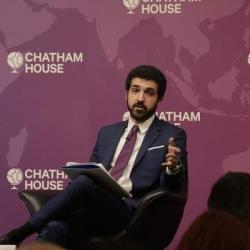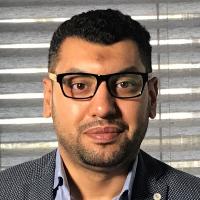

Past Event
Content from the Brookings Doha Center is now archived. In September 2021, after 14 years of impactful partnership, Brookings and the Brookings Doha Center announced that they were ending their affiliation. The Brookings Doha Center is now the Middle East Council on Global Affairs, a separate public policy institution based in Qatar.
The Brookings Doha Center (BDC) and the Arab Reform Initiative jointly organized a webinar discussion on February 24, 2021 on the role of Arab diasporas in pursuing transitional justice. The panelists explored the various strategies and mechanisms used by diaspora groups in their host countries to pursue transitional justice and accountability in Egypt, Libya, Syria, and Yemen. The panel consisted of a group of distinguished scholars and experts including: Noha Aboueldahab, fellow at BDC; Ibrahim Olabi, barrister at Guernica 37 International Justice Chambers; Ahmed Mefreh, executive director of the Committee for Justice; and Elham Saudi, director of Lawyers for Justice in Libya. The panel was moderated by Sarah Anne Rennick, deputy director of the Arab Reform Initiative.
Noha Aboueldahab began the discussion by reflecting on her own research experience and argued that most diasporic transitional justice advocates were mobile, relatively secured, and had access to international policymakers, international non-governmental organizations (NGOs), and international media. They are also very diverse professionally with many having established civil society initiatives and organizations outside their home states due to the various restrictions in their nations. However, they usually build collaborations with their fellow nationals at home. Aboueldahab added that the role of the new Arab diasporas in the pursuit of accountability has expanded the transitional justice process. With some Arab states suffering from rooted authoritarianism, ongoing armed conflict, and state fragmentation, the state’s role has also evolved. Aboueldahab explained that the state has been abandoned as being the main perpetrator in many transitional justice cases. Many activist lawyers and civil society professionals, both in the diaspora and at home, were leading cases against foreign governments and multinational corporations. For instance, Mwatana for Human Rights, a Yemeni NGO, together with a Berlin-based center for constitutional human rights and an Italian NGO have raised criminal complaints aiming to hold both the Italian state and its arms company accountable for the complicity in crimes committed in Yemen. Aboueldahab also touched on the role of transnational alliances in expanding the parameters of transitional justice, documenting evidence as a form of accountability and resistance, and leveraging criminal accountability to address additional justice issues. She concluded by highlighting the challenges faced by the diasporas which include polarization and the absence of sufficient space for communication and collaboration.
Ahmed Mefreh discussed the role of the Egyptian diaspora in defending human rights. He explained that the Committee for Justice was working on helping victims in Egypt obtain justice. The diasporic committee is based outside of Egypt due to the restrictions exerted by the authorities. Being away, the members are able to secure data portals of the gathered evidence away from the authorities’ control. In addition, Mefreh argued that western societies have the means to support human rights activists. Focusing mainly on transitional justice, he explained that there was no set example for Egypt to follow. Instead, the committee is studying other past experiences, such as that of South America, and gathering partial lessons from each journey to come up with a future roadmap for justice and accountability in Egypt. By examining international examples, the committee overcomes the lack of regional credibility and explores the right mechanisms to serve the best interest of the victims. Mefreh concluded by listing some of the challenges they, and the wider Arab diasporas, face. First, members of the diaspora struggle to adapt to a new environment when relocating to a foreign country. Second, the security situation inside the home country affects the work of the diaspora as it influences the evidence gathering process on the ground. Third, many human rights activists in the diaspora, even after fleeing their countries, continue to receive direct and indirect life threats from the regime. That said, Mefreh stressed that the work of the human rights defenders in the diaspora was crucial to set the public narrative and raise awareness among the international community.
Elham Saudi reflected on her experience as part of Lawyers for Justice in Libya. She explained that, for her and many others, pursuing transitional justice from the diaspora was not a deliberate decision, but rather a pathway shaped by their residency situation during the uprisings. The Libyan uprisings have become very violent shortly after starting, which made Libyan lawyers focus on justice and accountability since the beginning. Saudi argued that human rights activists, who were both at home and in the diaspora, focused on three elements of transitional justice. First, they gathered evidence, documented it, and preserved it for future use. Second, they explored processes and mechanisms to pursue accountability. Third, they looked for ways to prevent future crimes from happening. In terms of practical tasks, they were supported by people on the ground who collected the needed evidence; they used lobbying and other mechanisms to raise awareness among the international community; and they provided different trainings for those back home, so they survived the regime. On the challenges faced by human rights activists in the diaspora, Saudi highlighted the identity struggle of feeling as an “outsider inside and an insider outside.” She then added that while the majority would rather be on the ground, this dual identity allowed them to access both home-based and international actors. After that, Saudi pointed out that the term “transitional justice” can be interpreted and understood differently from a person to another. For instance, in Libya, many try to push for a “restorative justice,” which puts pressure on the victims to forgive and reconcile without necessarily holding the perpetrators accountable. However, while reconciliation is not a helpful fix, transitional justice is in one part on the roadmap. Saudi concluded by highlighting the importance of South-South cooperation among diasporas, especially that many perpetrators were alike across countries, which creates opportunities for joint advocacy.
Ibrahim Olabi continued the discussion by focusing on the Syrian diaspora and the ongoing Koblenz trials. He argued that Syrians did not give much attention to accountability or transitional justice at the time, given the ongoing active conflict and the political deadlock in Syria. However, straight after the 2011 uprisings, this was a hot topic with many trainings and workshops happening on the ground. Yet, these initiatives did not achieve any results; hence survivors and victims stigmatized and differently perceived transitional justice. Olabi added that due to the non-seceding conflict, more than half of the population had fled the country, making the Syrian diaspora one of the largest in numbers. This situation makes the pursuit of transitional justice complex: Is it a transitional justice for Syrians or for Syria? Olabi also discussed the challenge of the shortage of human rights defenders in the diaspora who are knowledgeable of the international law. In the past, the regime has deliberately stigmatized the study of humanities and law for decades, which eventually restricted the practice of law among a corrupt elite or a minority in the diaspora. Currently, this minority diasporic group plays a major role in setting the public narrative, fighting the regime’s propaganda, and raising awareness among the international community. In addition, it adds a strategic element to transitional justice planning, while lobbying and gathering the support of different foreign actors. It also leads mobilization initiatives, captures and supports new members of the diaspora, and gets victims to narrate their experiences to foreign authorities as in the Koblenz trials. Olabi argued that the Koblenz trials have raised many debates on who to prosecute, how to protect the victims, and how to save the current detainees. He concluded by echoing the importance of collaborations among different diasporas to push back as a unified front.
In the subsequent question and answer session, panelists considered the major challenges to transitional justice and the role of information and communications technology (ICT). Saudi argued that the support of the international community was crucial to seek accountability as in the Koblenz trials. However, first, the Libyan diaspora needs to educate the foreign society about the situation in Libya, which is a difficult task since the Libyan diaspora is much smaller and more scattered than the Syrian diaspora. On the role of ICT, Mefreh explained that it was crucial to communicate with the victims at home and gather evidence needed for the future. Saudi added that social media can also play a major role in raising awareness among the international community. Meanwhile, Olabi pointed out that social media can also be controlled by the regime to spread its own narrative and propaganda. The panelists also discussed the importance and challenges of fundraising to support the work of the diasporas.





Noha Aboueldahab
August 23, 2021

August 23, 2021

Yasmina Abouzzohour
August 19, 2021